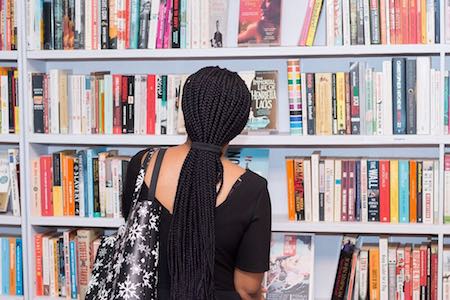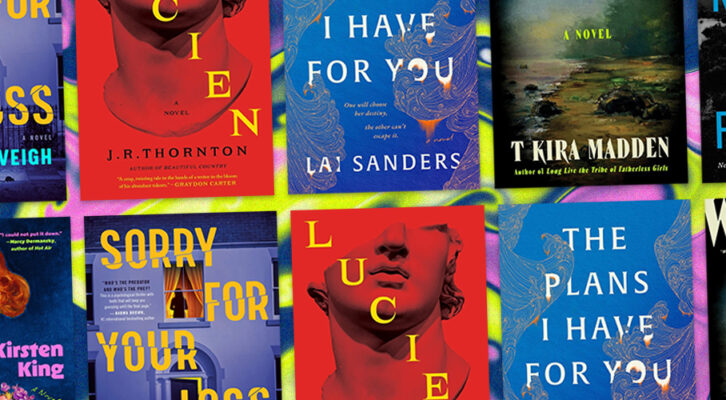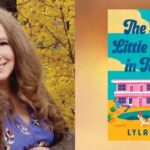
On Opening Ghana's First Subscription-Model Library
Libreria Ghana Began With a Personal Book Collection
After the library had emptied, and I was alone again, I reclaimed my favorite seat beside the African Writers shelf and surveyed the wall of books by authors whose mastery I sought to emulate. There had just been close to 45 people squeezed into my chocolate-box library in Accra designed for 30, sharing their experiences of being LGBTQ in Ghana.
Twenty minutes into the event, when we were already jammed to capacity, a group of young bohemians made an entrance, followed by more. It was another humid night in the city; the whir of the ceiling fans did nothing to lessen the heat and sweat from overcrowding and impassioned exchange. Eventually, we decamped to the courtyard below where, beneath a blanket of pitch-black sky, activists debated Africa’s gay history long into the evening, until security arrived to shut down the building. “This event could never happen in Lagos,” a transplant from Nigeria said.
It was April 2018, ten months since I moved from the UK to my parent’s native country, where I’d opened Libreria Ghana using 1,300 of my own books that had sat idle in a storeroom in my mother’s house in Ghana since 2011. I had amassed most of these works of literary fiction and narrative nonfiction, primarily by writers of color, in Brussels, Belgium, where I’d relocated from London for work in 2010.
Finding myself alone in an unfamiliar city, I retreated further into the world of letters, writing and reading to stave off the isolation. I’d buy books weekly from one cavernous secondhand bookstore, but these were no ordinary castoffs, they were special; well-cared-for with barely cracked spines by writers from around the world. It was as if their previous owners had, with great foresight, bequeathed them to me, and me alone, after they’d left this transient place, donating them as one would an organ. They gave me life. They literally held me when I needed uplift from the casual racism I faced.
When the books became too many to accommodate in my cramped studio, I’d ship them by container to Ghana where I’d visit them regularly, occasionally under the guise of seeing family, but always with a sense of duty. The guilt associated with knowing they were there, but weren’t being read when there was a need for access to culturally-relevant literature, was heavy, and I’d long hoped to make them publicly available.
That chance came in the spring of 2017, when I decided to leave London. Brexit had brought with it a grim new reality and that, combined with the exorbitant cost of merely existing, made me reconsider my relationship with the city I adored, a love affair that endures to this day. When I moved to Brussels for two years, I felt like I’d cheated on my significant other. But I was committed to focusing more fully on my writing, and living in London would make that impossible. Accra was the most seductive yet least adulterous choice.
Within 24 hours, I’d signed a two-year lease and arranged for my books to be transported the five-hour drive from my mom’s house.
One late-September afternoon, while running an errand in my new Accra neighborhood, I chanced upon an empty office on the first floor of a two-story complex. It was light and airy with plentiful wall space, perfect for a library. Within 24 hours, I’d signed a two-year lease and arranged for my books to be transported the five-hour drive from my mom’s house. The next few weeks were a whirlwind of activity, sourcing fittings and fixtures, cataloguing, and arranging. Two months later, I was ready to launch.
In the beginning, the spectrum of patrons was broad. There was Enyo, a serving soldier. Each Friday, without fail, he’d dash over from his barracks during his lunch break in full military fatigues to collect whatever story of triumph over adversity I’d recommend to him. There was Kelvin, Kwesi, Miriam, and Mary, and a whole gaggle of their chums from the nearby junior school. Every day, after class, they’d spill into the library like lava, eager to get their hands on the next Wimpy Kid installment. Gerd was a serious and refined philosophy student. He first came in search of classic African poetry before succumbing to the lure of The Rap Year Book and 3 Kings: Diddy, Dr. Dre, Jay-Z and Hip-Hop’s Multibillion-Dollar Rise.
There were young professionals—Mabel, a doctor, Amanda, a data analyst, and a plethora of creatives—who’d stop by for a hot tip and a chat, as would young families eager to engage their offspring in reading. In a sign of our dark times, there were a handful of mothers of teenage boys who’d relocated to Ghana with their sons to save them; they’d left behind careers, partners and, in some cases, other children, to flee the violence of urban America or the inner-city UK and find peace in a country where being a Black boy isn’t a crime nor a death sentence. They all came—the retired and the curious, those who’d travelled from near and far, persisting through the notorious, immovable Accra traffic. Some were in Ghana for a brief time, for work or studies. Others still were just passing through.
 Photo via Libreria Ghana
Photo via Libreria Ghana
The library operates on a subscription model. Members pay roughly eight dollars a month to borrow two books at a time. Children pay $3.50 and can take four books. Soon after launching, I hired an assistant who’d open up from Tuesday to Saturday, 12pm-8pm, and help organize a program of author readings, game nights, writing groups, and book clubs. I continued to work in corporate communications to fund the library’s operating costs as subscriptions barely scratched the surface—rent in U.S. dollars, utilities, wages, buying new releases to keep the collection current.
The most popular books were those authored by Africans. They tended to be from the new generation of post-poverty writers in whose contemporary narratives readers found something of themselves—Adichie, Adebayo, Arimah, Adeyemi, Attah, Gyasi, Habila, Selasi, Wainana—and women writers, for the most part. Members would delve into the authors’ entire back catalogues, eschewing the recently published for the debut or the follow-up. They did this, I suspect, to get a firm grounding in the oeuvre, particularly of celebrity authors like Adichie and Wainana, as it had become de rigueur to talk books in the trendy cafés and bars of central Accra.
Yet each time someone would come in to borrow, my heart would plummet. I’d shut my eyes, inhale, and pause, as if in a ritual, before cautiously handing over the volume. I’d wonder if it would be the last time I’d see it. On occasion, it was. The loss of a signed copy of Teju Cole’s Open City hurts to this day, as does the theft of Jamaica Kincaid’s A Small Place and Assata Shakur’s eponymous memoir.
After months of serving people not unlike myself, Diasporans, Afropolitans, and the so-called “been-tos,” I realized that being stuck in the cosy confines of the library was counterproductive to what I hoped to achieve. The whole idea of the library was to provide books to those who needed them most, and that required meeting people where they were. Official statistics claim that Ghana has a literacy rate of 70 percent. But when I began doing outreach work, stepping outside the cosmopolitan capital and entering the rural communities where the majority of the population live, I found that simply wasn’t the case. The fact is, many Ghanaians can’t read.
Gem Star School, in the sprawling urban slum of Ashaiman, was founded by a former government school teacher in her thirties universally known as Auntie Grace. The school is home to about 500 children, aged kindergarten through ninth grade, where students and teachers are more like child and parent than pupil and master. They refer to each other in familial terms—Auntie Hannah, Bro Emmanuel, Uncle Seth—and treat the school as a place in which they all have a stake, turning up judiciously before class and on weekends to sweep the compound, play, and learn.
 Photo via Libreria Ghana
Photo via Libreria Ghana
When I first visited Gem Star, days before the end of the academic year, there were lots of children but hardly any books, just 15 Kindles gifted by a charity. I offered to donate 300 age-appropriate print titles, and the school converted a cubicle-sized space that was being used as a makeshift staffroom into a tiny library. The students were invigorated. Many of them have since become voracious readers who can’t get enough of global bestsellers like The Dork Diaries and Children of Blood and Bone. The transformative power of books is beautiful to witness.
But not all experiences are the same. When my colleague, Seth, and I went to set up a school library in the small town of Kumawu, about four-and-a-half-hour drive north of Accra, we were crestfallen to meet a 13-year-old boy who could barely read a page of a Mr. Men book designed for three to five-year-olds. The boy wasn’t an anomaly; the teachers and staff were so dismissive of his and the other children’s efforts, sniggering at their stunted delivery and taunting them when they mispronounced words, that they extinguished the flicker of interest before a fire could spark.
Shortly after this, Angelina, a university student who’d worked with the library in Accra, asked to borrow 30 children’s books for a literacy camp in the Eastern Region. When she returned the books three weeks later, she said they’d been of no use; the 15 and 16-year-olds she was teaching struggled to get through the basic alphabet picture book, A is for Accra. Giving them Deenie or The Hate U Give would’ve been like hitting them with War and Peace. This disparity between town and country, rich and poor, is flagrant, at least to those who care to see it.
Doing this work is both selfless and selfish. For every child I help to read, it’s not just their life that’s changed, but mine.
Running the library and its outreach programs has come at a cost. It continues to function at a loss and, in addition to this financial toll, I’ve paid with the time I used to spend on writing. Many days I’ve wanted to escape the world so I could untangle myself in my prose.
But doing this work is both selfless and selfish. For every child I help to read, it’s not just their life that’s changed, but mine. To deny the feeling of pleasure and, indeed, self-satisfaction that comes from knowing you’ve made a difference to an individual, a community and, by extension, a society, would be to deny being human. After all, the payoff of self-sacrifice is often self-fulfillment. There are no saviors, not even Black ones.
Recently, I revisited Caryl Phillips’ brilliant essay collection, Colour Me English. Inside, I was surprised to discover an obituary for the late British-Trinidadian poet John La Rose. As the founder of New Beacon Books and the George Padmore Institute, La Rose is best known as a publisher and activist, but Phillips puts his literary legacy into context:
John La Rose […] fully understood the demands of literature […] He made a choice to keep the door to an active public life propped wide open and to step through it with vigour knowing that this would prevent him from living the full literary life.
Perhaps my destiny isn’t to be the next Adichie but something more akin to La Rose. To be, as Phillips describes him, “…a writer who in the end did not have much time to write […] who decided that rather than build citadels around his life that would be necessary for him to concentrate on his own work, he would give to others.”
The last time I visited Gem Star School, Stephen, six, a member of our biweekly creative writing class, ran up to me in the compound as I was leaving. “Madame, will you be back next week?” he asked, breathless from playing soccer. When I said no, I’d be going to London, he screwed his tiny face and looked askance at me. “Did they born and raise you in London?” Yes, I replied and, for a moment, he was still. “Is that why you speak like an American?” I smiled, nodded, and assured him I’d be back, promising myself that one day I will write about my people and this place. For that, I’ll make time.
Sylvia Arthur
Sylvia Arthur is a narrative nonfiction writer whose work has been published in The Guardian, The British Journalism Review, and on the BBC website. She is the founder of Libreria Ghana, a library and literacy outreach agency based in Accra.



















